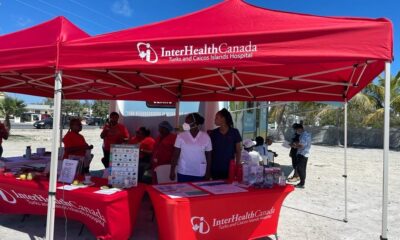By Deandrea Hamilton and Dana Malcolm
Editorial Staff
#TurksandCaicos, March 6, 2023 – The absence of health check-ups has led to a high instance of KIDNEY DISEASE in the Turks and Caicos Islands, now the Ministry of Health in partnership with the TCI Hospitals is running an intervention program aimed at getting residents ‘in the know’ about the health of their kidneys.
Ahead of World Kidney Day, which is on Thursday March 9 residents of the Turks and Caicos are being encouraged to check up on their kidneys for earlier detection of damage or risk.
Because the statistics are so alarming, the TCI Hospitals in collaboration with the TCI Ministry of Health and Human Services will host a free kidney disease prevention drive in Providenciales, today Tuesday, March 7th where you can get your kidneys screened free by doctors at the government’s Mobile Clinic. The program opens from 10 am to 2 pm in Butterfield Square in down town, Providenciales.
In Turks and Caicos, there is cause for concern when it comes to kidneys. The organs which are responsible for: removing waste products from our bodies; removing drugs from our bodies; balancing our body’s fluids; releasing hormones that regulate blood pressure; producing vitamin D which promotes strong, healthy bones and the kidneys manage the production of red blood cells.
manage the production of red blood cells.
“Up to 50% of persons starting dialysis were not previously being monitored by a Nephrologist. It is therefore important that high-risk individuals check their kidney function on a regular basis. High-risk persons include those with diabetes, hypertension, heart disease and those with kidney disease in their families,” said Vancelee Forbes, Nephrologist (Kidney Specialist) at the TCI Hospitals.
Dr. Forbes revealed that there are currently 60 individuals with renal failure receiving dialysis across both sites at Cheshire Hall Medical in Providenciales and Cockburn Town, Medical in Grand Turk. However, it is the nearly 300 other residents who were unaware of chronic kidney disease which raised red flags; only detected when these hundreds sought care at clinics across the country.
Renal failure means the kidneys cannot clean the blood on their own any longer and affected individuals require hours of dialysis weekly to stay alive. Chronic kidney disease which has very few symptoms until it is in the late stages can cause this. It can occur over months or years with early detection increasing patients’ survival chances.
Dr. Forbes shared with Magnetic Media the workings of their Hemodialysis Unit.
“Persons requiring dialysis are managed in dialysis clinics. Services include hemodialysis and peritoneal dialysis. These persons require a living donor.” The doctor said, “Additional support services include access to a dietician, physiotherapy as needed, psychology and psychiatry services as needed.”
And locally, transplant surgeries are not possible but donors are welcomed. Dr. Forbes said a UK overseas territory programme allows for the procedure.
“A TCI resident received a kidney from a relative via the programme. Currently, we need healthy people who are willing to donate one of their kidneys,” the specialist implored.
Patients with chronic kidney disease who are not on dialysis are treated in the Renal and Internal Medicine clinics but, for the TCI Hospitals, the aim is to catch these issues early before they balloon into complete renal system failure.
These partners in health agree that the Free Clinic is a good first step. Adults, that is residents over the age of 18, can access the screening today beginning at 10 a.m.


 Caribbean News1 week ago
Caribbean News1 week ago
 Caribbean News7 days ago
Caribbean News7 days ago
 Caribbean News1 week ago
Caribbean News1 week ago
 Caribbean News1 week ago
Caribbean News1 week ago
 Bahamas News7 days ago
Bahamas News7 days ago
 News7 days ago
News7 days ago
 Bahamas News1 week ago
Bahamas News1 week ago
 News7 days ago
News7 days ago
























